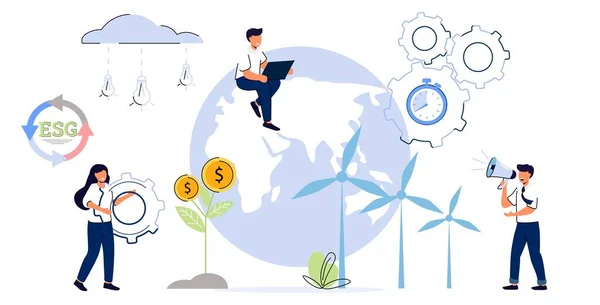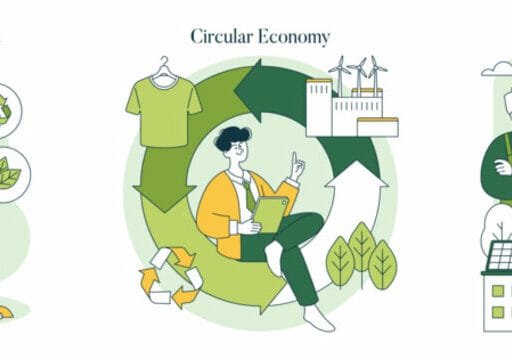Sustainability is becoming a strategic requirement in today’s corporate environment, not only an ethical decision. ESG (environmental, social, and governance) practices are becoming a major determinant of a business’s long-term performance. ESG is becoming a major factor in determining financial success and brand reputation as investors, consumers, and regulators prefer companies who put this priority first. The business value of ESG is examined in this article, along with how it improves operational effectiveness, boosts investor confidence, and creates a strong brand. We will discover why ESG is the way of the future for long-term, sustainable corporate success through data-driven insights, real-world case studies, and comparative research.
Why ESG Matters: A Business Value of ESG
ESG is becoming a competitive advantage rather than just a business jargon. Businesses that use ESG principles report improved risk mitigation, regulatory compliance, and profitability. A comparison of businesses that prioritize ESG and others who disregard these trends can be seen below.
ESG Companies vs. Non-ESG Companies
| Factors | ESG-Focused Companies | Non-ESG Companies |
|---|---|---|
| Investor Confidence | High | Low |
| Regulatory Risks | Low | High |
| Brand Reputation | Strong | Weak |
| Long-term Profitability | High | Unstable |
| Employee Retention | High | Low |
| Environmental Compliance | Strong | Poor |
Case Study: How Unilever Leads in ESG
Through its Sustainable Living Plan, Unilever has incorporated ESG into its main business strategy. By giving social impact, governance, and environmental sustainability a priority, Unilever has:
- Reduced carbon emissions by 50%
- Increased sales from sustainable brands by 69%
- Built stronger investor confidence, leading to higher stock performance
With its Sustainable Living Plan, Unilever, a worldwide pioneer in sustainability, exemplifies the economic benefits of ESG. The business demonstrates how sustainability propels long-term success and profitability by incorporating Environmental, Social, and Governance (ESG) principles into its fundamental operations.
Reduction of environmental impact, Unilever has achieved a 50% reduction in carbon emissions and plans to achieve net-zero emissions by 2039. Sustainable sourcing is used to lessen environmental damage, more than 67% of its agricultural raw materials originate from sustainable sources. With social responsibility and throughout its supply chain, Unilever supports safe working conditions and fair salaries for more than 1.5 million people. By guaranteeing moral corporate conduct and open ESG reporting, the organization wins over customers and investors under governance and transparency.

Business Value of ESG to Building Investor Trust and Ensuring Regulatory Compliance
ESG considerations are becoming more and more important to investors. Strong ESG commitments are frequently associated with increased investor trust in a company because they show a proactive approach to risk management and sustainable growth. Companies with strong ESG policies often have superior financial success, which attracts more investors, according to a 2021 research by the NYU Stern Center for Sustainable Business, which examined over 1,000 papers.
Globally, regulatory environments are changing to take ESG factors into account. Proactively implementing ESG practices puts businesses in a better position to handle these developments, guaranteeing compliance and averting fines. In addition to protecting the business, this conformity with regulatory standards makes it more appealing to investors looking for reliable and legal investment options. ESG has never been more important to investors. According to a 2023 Bloomberg research, by 2025, ESG investments might amount to $53 trillion, or one-third of all assets under management worldwide.
How ESG Builds Investor Confidence
- Improved Risk Management: Businesses with robust ESG policies are better able to withstand crises and economic downturns.
- Higher Returns: In terms of stock market performance, ESG-driven businesses do better than their rivals.
- Long-Term Stability: Companies with sound governance and social responsibility are preferred by investors.
Improving Operational Efficiency and Reducing Risks
Operational efficiency may be significantly increased by putting ESG concepts into practice. For example, using eco-friendly technology may save money by lowering waste and energy usage. Fair labor standards and other social activities may boost worker productivity and happiness, which will increase operational efficiency even further. Strong ESG practices also operate as a protective barrier against a number of hazards. Businesses that put an emphasis on environmental stewardship are less likely to incur cleanup expenses or environmental fines. In a same vein, organizations that maintain high standards for governance and society are less vulnerable to scandals, legal action, or harm to their brand. Businesses may guarantee more reliable and predictable operations by reducing these risks, highlighting the importance of ESG for business.
Environmental Cost Savings
- Energy-efficient processes cut expenses by as much as 30%
- Programs for waste management reduce costs by 15% to 20%.
- Reliability is increased and interruptions are decreased in sustainable supply networks.
Risk Reduction Benefits
- Governance: Strong governance minimizes fraud and compliance risks
- Social Responsibility: Ethical business practices reduce reputational damage
- Environmental Compliance: Helps avoid hefty fines and legal actions
Brand Reputation and Business Value of ESG
A company’s dedication to ESG may have a big impact on its brand reputation in a time when customers are more aware of and concerned about corporate ethics. Businesses who are open about their ESG initiatives and show sincere dedication frequently see an increase in client loyalty and are able to stand out in crowded markets. This favorable opinion may result in increased sales and market share, highlighting the importance of ESG for business.
Today’s consumers choose businesses that put ESG first. 73% of people worldwide would pay more for sustainable items, per a Nielsen research.

Why ESG Boosts Brand Reputation
- Transparency increases stakeholder and customer trust.
- Sustainable goods increase customer loyalty.
- Positive brand distinction is produced via ESG-driven marketing.
Example: Patagonia’s ESG Success
This shows how ESG’s commercial value goes beyond compliance; it also generates market leadership. Leading the way in sustainability and moral corporate conduct, Patagonia has produced:
- A devoted clientele that backs ethical shopping
- Profitability gains from eco-friendly clothing brands
- A strong brand reputation provides a competitive advantage
Driving Long-Term Growth and Competitiveness
ESG standards are not just about lowering risks or enhancing reputation; they are crucial for fostering long-term growth and competitiveness. When companies include ESG into their core strategy, they are better equipped to innovate, take advantage of new possibilities, and adapt to changing market dynamics. This adaptability ensures sustained growth and a competitive edge in the marketplace.
| ESG Factor | Business Growth (%) |
|---|---|
| Sustainability Initiatives | 65% |
| Energy Efficiency Programs | 72% |
| Ethical Sourcing | 58% |
| Strong Governance Practices | 79% |
This proves that companies investing in ESG strategies are more likely to thrive in the long run.
Top 5 FAQs on ESG and Business Value
1: Why is ESG important for businesses?
ESG drives long-term profitability by boosting investor confidence, fortifying risk management, and enhancing brand reputation.
2: How does ESG attract investors?
Investors prefer companies with strong governance and sustainability strategies, as they offer lower risks and higher returns.
3: Can ESG improve operational efficiency?
Yes, energy savings, ethical sourcing, and sustainability initiatives lead to reduced costs and better efficiency.
4: What industries benefit the most from ESG?
Sectors like finance, retail, energy, and technology benefit significantly from sustainability-focused practices.
5: How can small businesses adopt ESG?
SMEs can start by implementing sustainable supply chains, ethical sourcing, and energy-efficient operations.
Conclusion
Businesses that combine environmental, social, and governance policies increase operational effectiveness, lower risks, and boost investor confidence. ESG promotes growth, innovation, and long-term profitability in addition to compliance. In many terms infusion of business value of ESG is very crucial. Adopting ESG isn’t a choice; it’s a need for organizations as market expectations change. Businesses who take the lead in sustainability will influence international trade in the future, demonstrating the indisputable commercial worth of ESG.








